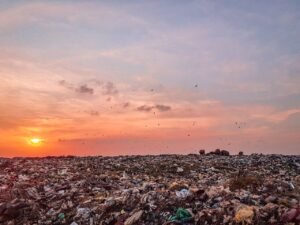Introduction
Pollution is a inescapable and squeezing worldwide issue, alluding to the presentation of contaminants into the normal environment, causing antagonistic impacts. This complex issue shows in different shapes, counting discuss, water, soil, and commotion contamination, each posturing critical dangers to biological systems, human wellbeing, and biodiversity. Human exercises, such as mechanical forms, deforestation, and the burning of fossil fills, contribute significantly to the heightening of contamination.
The results are far-reaching, enveloping climate alter, respiratory infections, misfortune of biodiversity, and compromised water quality. Handling contamination requires a collective exertion including governments, businesses, and people to receive economical hones, actualize rigid controls, and advance natural mindfulness. Recognizing the gravity of the circumstance is essential in cultivating a commitment to protecting the planet for future eras.
Common Types of Pollutions

There are several types of pollution, each having unmistakable characteristics and impacts on the environment.
Air Pollution
Mechanical outflows, vehicle debilitate, burning of fossil powers, and common sources like fierce blazes.
Impacts: Respiratory illnesses, exhaust cloud arrangement, corrosive rain, and climate alter.
Water Pollution
Release of mechanical toxins, agrarian runoff, Dis-Honorable transfer of squander, and oil spills.
Impacts: Defilement of drinking water, hurt to sea-going environments, and negative impacts on human wellbeing.
Soil Pollution
Pesticides, herbicides, mechanical squander, and inappropriate transfer of strong squander.
Impacts: Corruption of soil ripeness, disturbance of biological systems, and potential hurt to human wellbeing through sullied nourishment.
Noise Pollution
Activity clamor, mechanical apparatus, development exercises, and social occasions.
Impacts: Hearing disability, stretch, rest unsettling influences, and antagonistic impacts on natural life.
Causes of Pollution
| Countries With High Pollution |
| Rank | Country | Rates |
| 1st | Chad | 89.7 |
| 2nd | Iraq | 80.1 |
| 3rd | Pakistan | 70.9 |
| 4th | Bahrain | 66.6 |
| 5th | Bangladesh | 65.8 |
| 6th | Burkina Faso | 63 |
| 7th | Kuwait | 55.8 |
| 8th | India | 53.4 |
| 9th | Egypt | 47 |
| 10th | Tajkistan | 45.4 |
Industrial Works
Numerous businesses discharge toxins into the discuss, water, and soil amid fabricating forms. Emanations from industrial facilities, chemical plants, and refineries contribute essentially to discuss and water contamination.
Vehicle Outflows
The combustion of fossil powers in vehicles discharges toxins such as carbon monoxide, nitrogen oxides, and particulate matter, contributing to discuss contamination. Also, oil spills from vehicles and transportation exercises can lead to water contamination.
Deforestation
Clearing huge ranges of timberlands for agribusiness, logging, or urban advancement not as it were comes about within the misfortune of biodiversity but too disturbs environments and contributes to discuss and soil contamination.
Agricultural Activity
The utilize of fertilizers, pesticides, and herbicides in farming can lead to water and soil contamination. Runoff from ranches carries these chemicals into water bodies, affecting sea-going environments.
Incomplete Waste Dispose
Insufficient transfer of strong and dangerous squander, counting plastics, chemicals, and electronic squander, leads to contamination of arrive, water, and discuss. Disgraceful transfer strategies such as open burning can discharge hurtful substances into the climate.
Mining Works
Extraction of minerals and metals from the Soil can result in soil and water contamination due to the discharge of poisonous substances. Runoff from mining locales can sully adjacent water sources.
Power Productions
The burning of fossil powers for power era discharges poisons, counting carbon dioxide, sulfur dioxide, and mercury, contributing to discuss and water contamination.
Urbanization
Fast urbanization can lead to expanded contamination levels due to variables such as development exercises, expanded vitality utilization, and higher levels of squander era.
Effects of Pollution

Pollution, in its different shapes, has wide-ranging impacts on the environment, human wellbeing, and environments. Here are a few of the key impacts of contamination
Air Quality Debasement
Impacts On Health is Respiratory issues, hypersensitivities, and cardiovascular infections can result from presentation to discuss poisons like particulate matter, nitrogen oxides, and sulfur dioxide.
Water Defilement
Wellbeing Changes by Sullied water sources can lead to waterborne illnesses, influencing human wellbeing.
Oceanic Environment Affect: Contaminated water can hurt oceanic life, disturb environments, and lead to the decrease of different species.
Soil Debasement
Agrarian Affect on Soil contamination can influence trim quality and surrender, possibly driving to nourishment defilement.
Environment Disturbance cause Sullied soil can hurt earthly environments and decrease biodiversity.
Climate Changes
Nursery Gas Emanations is the discharge of toxins such as carbon dioxide contributes to the nursery impact, driving to worldwide warming and climate alter.
Loss of Biodiversity
Living space Pulverization by Contamination can result within the devastation of normal environments, driving to the misfortune of different plant and creature species.
Commotion Contamination:Health Impacts: Delayed introduction to over the top clamor levels can lead to stretch, hearing impedance, and rest unsettling influences.
Light Contamination
Ecological Disturbance by Fake light can disturb environments, influencing natural life behavior, relocation designs, and the regenerative cycles of certain species.
Ozone Consumption
Ultraviolet Radiation is a Certain toxins contribute to the exhaustion of the ozone layer, permitting more destructive bright (UV) radiation to reach the Earth’s surface, posturing dangers to human wellbeing and biological systems.
Asset Consumption
Overconsumption in Contamination can result from the unsustainable utilize and consumption of normal assets, contributing to natural debasement.
Economic Affect
Healthcare Costs: Pollution-related wellbeing issues lead to expanded healthcare costs for people and governments.
Efficiency Misfortune: Natural contamination can decrease efficiency in segments such as horticulture, fisheries, and tourism.
Stylish and Social Affect
Visual Pollution: Unattractive contamination, such as litter and mechanical structures, can decrease the stylish quality of scenes and affect social legacy destinations.
Social Incongruities
Environmental Equity: Certain communities may bear a unbalanced burden of contamination, driving to social disparities and natural equity concerns.
Why Pollution Is A Problem

Pollution is an raising worldwide pickle that postures critical dangers to the environment, human wellbeing, and biodiversity. The aimless discharge of poisons into the discuss, water, and soil has come to disturbing levels, fueled by industrialization, urbanization, and unsustainable human exercises. Discuss contamination, basically caused by emanations from vehicles, production lines, and control plants, not as it were falls apart discuss quality but moreover contributes to respiratory maladies and climate alter.
Water contamination, coming about from mechanical releases, agrarian runoff, and inappropriate squander transfer, jeopardizes oceanic environments and imperils the accessibility of clean water for human utilization. Soil contamination, frequently connected to the utilize of pesticides and disgraceful squander transfer, debases soil ripeness and influences the nourishment chain. The total affect of contamination expands past prompt natural concerns to include broader issues such as misfortune of biodiversity and disturbance of environments. Critical and concerted endeavors are required on a worldwide scale to address the root causes of contamination, actualize maintainable hones, and create inventive arrangements to moderate its negative impacts on the planet and its tenants.
How Can We Stop The Pollution

Halting and reversing pollution requires a multifaceted and collaborative approach that involves individuals, communities, industries, and governments. First and foremost, fostering awareness and education on the consequences of pollution is crucial to instigate behavioral change. Individuals can contribute by adopting sustainable practices in their daily lives, such as reducing single-use plastic, conserving energy, and practicing responsible waste disposal.
Governments play a pivotal role in implementing and enforcing environmental regulations, incentivizing eco-friendly technologies, and investing in public transportation infrastructure to reduce vehicular emissions. Industries must embrace cleaner production methods, employ eco-friendly technologies, and adhere to stringent environmental standards. Encouraging research and development for innovative and sustainable solutions is essential to finding alternatives to harmful practices.
International cooperation is also imperative to address transboundary pollution and coordinate efforts on a global scale. Supporting and promoting initiatives that focus on renewable energy sources, reforestation, and waste management can contribute significantly to curbing pollution. By working together, we can create a more sustainable and healthier future, where pollution is minimized, and the delicate balance of our ecosystems is preserved for generations to come.








